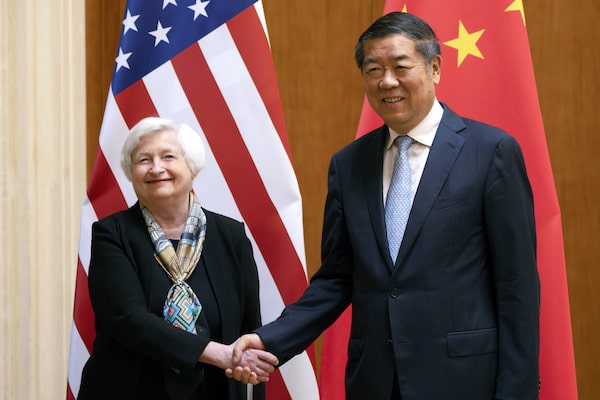
U.S. Treasury Secretary Janet Yellen shakes hands with Chinese Vice Premier He Lifeng during a meeting at the Diaoyutai State Guesthouse, in Beijing, on July 8.Mark Schiefelbein/The Associated Press
U.S. Treasury Secretary Janet Yellen will meet with Chinese Vice Premier He Lifeng in San Francisco this week to try to deepen a fledgling economic dialogue between the world’s two largest economies ahead of a U.S.-hosted summit of Pacific Rim leaders.
The Treasury said the Nov. 9-10 meetings will also convene the new economic and financial forums launched in October by the Treasury and China’s finance ministry and central bank.
Yellen first met with He, China’s new economic czar, in July, when she visited Beijing to try to stabilize a deteriorating U.S.-China relationship amid growing U.S. restrictions on sensitive technologies.
The San Francisco meetings will take place just before the Biden administration hosts ministers and leaders of Asia Pacific Economic Cooperation countries from Nov. 11-17 – a gathering during which U.S. President Joe Biden is aiming to meet with Chinese President Xi Jinping.
A senior U.S. Treasury official downplayed the idea that there would be specific “deliverables” from the Yellen-He meetings, saying it was not a “policy trade” situation “where we trade one thing for another.”
But the official said a key aim for Yellen was gaining a better understanding of how the new U.S.-China economic communication line will work, and how to make sure that “it is not vulnerable to shocks,” adding that there will be more frequent interactions.
Yellen also is keen to discuss what steps Chinese officials are contemplating to support their flagging economic growth, and what circumstances might change their policy path.
Amid growing concerns that China will try to dump more manufactured goods on U.S. and global markets, Yellen is expected to warn He against using massive industrial subsidies to state firms and shutting U.S. companies out of domestic markets, the official said.
“This week, I will speak to my counterpart about our serious concerns with Beijing’s unfair economic practices, including its large-scale use of nonmarket tools, its barriers to market access, and its coercive actions against U.S. firms in China,” Yellen said in an opinion piece published by the Washington Post.
She reiterated that the U.S. was seeking “healthy competition” with China and was not trying to “trigger a “disorderly wholesale private-sector pullback from China with actions to diversify supply chains and protect U.S. national security.”
The communications so far have helped U.S. officials to explain policies such as export controls and restrictions on outbound U.S. investment to China to counterparts in Beijing.
But Yellen said her engagement with He was not meant to reconstitute the broad, Obama-era U.S.-China Strategic and Economic Dialogue, which was widely criticized for its ineffectiveness.
Instead, Yellen said she was “focusing on specific, high-priority economic topics on which we can make tangible progress.”
Among these are co-operating on global challenges such as tackling climate change, speeding debt relief to poor countries, and reducing illicit financial flows that support terrorism and the illegal drug trade.